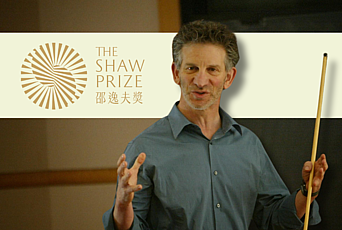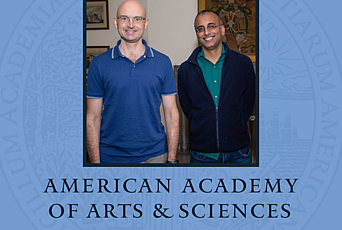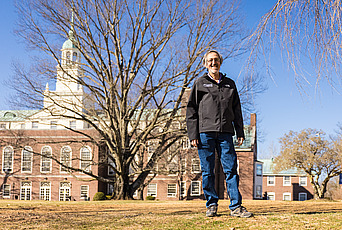Three World-Leading Mathematicians Join IAS Faculty
Press Contact

The Institute for Advanced Study has named three new permanent Faculty to the School of Mathematics in the fields of pure mathematics and computer science. Irit Dveer Dinur (theoretical computer science), Elon Lindenstrauss (dynamical systems), and Aaron Naber (geometric analysis) will begin their Institute appointments this summer. Considered one of the top honors in academia, IAS Faculty appointments are reserved for the world’s foremost leaders in their respective fields.
“The storied place of the Institute for Advanced Study in the history of modern mathematics is built on the distinctive quality of the faculty it has been able to attract since its founding,” stated David Nirenberg, IAS Director and Leon Levy Professor. “The recruitment of each of these three deeply creative scholars to the Faculty of the School of Mathematics continues that tradition, and promises another generation of remarkable discovery.”
A preeminent figure in the field of theoretical computer science, Irit Dinur joins the Institute from the Weizmann Institute of Science in Israel. Over the course of her career, Dinur has made numerous transformative contributions to the study of computational complexity, publishing groundbreaking work on optimization, expansion of graphs and hypergraphs, coding theory, and differential privacy.
“I am honored and excited to join IAS, and I am in awe of its incredible history,” said Dinur. “I am particularly delighted by the ongoing commitment of IAS and the School of Mathematics to the field of theoretical computer science.”
Dinur is especially renowned for a groundbreaking solo publication on probabilistically checkable proofs (PCPs). The original proof of the PCP theorem was heavily algebraic, making it complex to use and teach. For many years this complexity seemed unavoidable, but in 2006, Dinur published a remarkable new proof of the central theorem, a simplification that has had major impact in the field. Her achievement was recognized with the 2019 Gödel Prize. In addition, she has contributed significantly to the development of differential privacy theory, which has had far-reaching practical applications. It was used in the 2020 U.S. Census and adopted by large companies as a method for conducting data analysis while protecting individual privacy. This work saw Dinur receive the 2021 ACM Paris Kanellakis Theory and Practice Award.
“Irit is a perfect fit for the School of Mathematics,” says Avi Wigderson, Herbert H. Maass Professor in the School. “She is a visionary leader, with expertise that is both deep and broad. Her drive, stamina, and technical prowess are of the highest caliber, and she is an inspiring speaker and a dedicated mentor to many students and postdocs.”
Dinur has previously spent time at IAS as both a Member (2001–02) and Visiting Professor (2019–20), when she temporarily led the Institute’s Computer Science and Discrete Mathematics program, founded in 1999 by Avi Wigderson. In addition to the honors already mentioned, Dinur was the recipient of the 2012 Erdős Prize in Mathematics and, in 2010, was a plenary speaker at the International Congress of Mathematicians.
Elon Lindenstrauss is a leading authority in the field of ergodic theory, dynamical systems, and their applications to number theory. He joins the Institute from the Hebrew University of Jerusalem, where he has been a Professor at the Einstein Institute of Mathematics since 2008.
“IAS has been a very meaningful place in my career. I learned a lot about number theory when I arrived at IAS as a fresh postdoc in 1999, and later, when I returned to Princeton as faculty, would often bike to IAS in the evening (or even rather late at night) to talk with Jean Bourgain,” explained Lindenstrauss. “I am excited (and slightly awed) by the opportunity to return to IAS, which has played such an important role in my outlook on mathematics, and look forward to interacting with the many bright Members and postdocs that come to the Institute.”
In addition to his initial IAS Membership from 1999–2001, Lindenstrauss returned to the Institute in 2007, 2009–10, and 2018 as both a Member and Visitor. While at the Institute, he has incorporated techniques from arithmetic combinatorics into his work, gleaned from past IAS Professor (1994–2018) Jean Bourgain. He has also maintained connections with Peter Sarnak, Professor Emeritus, and Akshay Venkatesh, Robert and Luisa Fernholz Professor, in the School, who have witnessed Lindenstrauss’s influence on their field of number theory.
Widely recognized for his early career achievements, “Elon has remained exceptionally active and, in particular, has within the past three years produced an entirely new collection of breakthrough results which will again revolutionize the field,” remarked Sarnak.
The work of Lindenstrauss traces its roots to the area of classical mechanics. His research provides insight into questions such as: How does one understand the long-term evolution of the solar system? His work on homogeneous dynamical systems, which serves as a model for more complicated dynamical systems, has been a major driver in pushing the field forward.
Lindenstrauss was awarded the Fields Medal in 2010 for his results on measure rigidity in ergodic theory, and their applications to number theory. His other honors include the Fermat Prize (2010), Anna and Lajos Erdős Prize in Mathematics (2009), Michael Bruno Memorial Award (2008), European Mathematical Society Prize (2004), and the Salem Prize (2003). He was elected to both the Academia Europaea and the Israel Academy of Sciences and Humanities in 2012.
“Elon’s work has, by breaking through crucial barriers, opened up whole fields of research,” said Venkatesh. “He is also a thoughtful mentor and a generous collaborator. I am delighted to welcome him to our School.”
Aaron Naber, a world-renowned geometric analyst, joins the Institute from Northwestern University, where he has served as the Kenneth F. Burgess Professor of Mathematics since 2015. Naber has garnered widespread acclaim for his pioneering advancements, successfully resolving several longstanding conjectures and introducing innovative techniques which have had lasting influence across various mathematical disciplines.
“I am deeply honored and grateful for the opportunity to join the Institute for Advanced Study in Princeton,” remarked Naber. “The Institute has been a worldwide center for mathematics and other sciences over the years, and I look forward to making my own small contributions toward its continued development.”
In particular, his work has opened new horizons for studying singular sets arising in the calculus of variations. Powerful techniques that he has developed in the field of Riemannian geometry have also brought about new understandings of the structure of Gromov-Hausdorff limit spaces with lower Ricci bounds, Einstein manifolds, and their degenerations.
Describing Naber as “a formidable problem solver,” Camillo De Lellis, IBM von Neumann Professor in the School of Mathematics, praised his ability to “crack long-standing and central open questions which defied the understanding of a number of experts. Many of these problems were stumbling blocks in their respective areas, but Aaron has found quite stunning new ideas and original perspectives in order to tackle them.”
Naber’s foundational contributions were recognized with the 2018 New Horizons Prize in Mathematics and his work on rectifiability, isometry group and co-dimension 4 conjecture also earned him the 2023 Fermat Prize. Naber’s other honors include Sloan and American Mathematical Society fellowships, which he received in 2014 and 2017 respectively. He was also named a Simons Investigator in 2023 and elected to the National Academy of Sciences in 2024.
About the Institute
The Institute for Advanced Study has served as one of the leading independent centers for theoretical research and intellectual inquiry since its establishment in 1930, advancing the frontiers of knowledge across the sciences and humanities. From founding IAS Faculty Albert Einstein, Erwin Panofsky, and John von Neumann to influential figures Emmy Noether, George Kennan, and J. Robert Oppenheimer to the foremost thinkers of the present, IAS is dedicated to enabling independent inquiry and fundamental discovery.
Each year, the Institute welcomes more than 250 of the world’s most promising post-doctoral researchers and scholars who are selected and mentored by a permanent Faculty, all of whom are preeminent leaders in their fields. Among present and past Faculty and Members, there have been 35 Nobel Laureates, 44 of the 62 Fields Medalists, and 23 of the 27 Abel Prize Laureates, as well as winners of the Turing Award; the Pulitzer Prize in History; the Wolf, Holberg, and Kluge prizes; and many MacArthur and Guggenheim fellows, among other honors.


